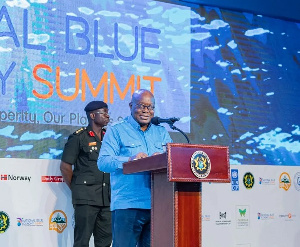We are committed to a sustainable, thriving ocean economy – Akufo-Addo

To achieve this, government will therefore ramp up its close collaboration with the private sector, civil society organisations (CSOs), academia and multinational corporations to develop suitable policies and programmes to aggressively protect the country’s coastal and marine’s resources.
“Given the present economic, environmental and geopolitical context, the country’s ocean presents an incredible opportunity to accelerate the development agenda of our beloved country and improve the wellbeing of our people,” said President Akufo-Addo, who’s a member of the High Level Panel for a Sustainable Ocean Economy.
He was speaking at the National Blue Economy Summit on Wednesday, May 31, 2023 in Accra. The two-day summit was organised by the Sustainable Development Goals (SDGs) Advisory Unit Office of the President, under the theme Our Ocean’s Health, Our Prosperity, Our Planet’s Security, in partnership with the government of Norway, United Nations Development Programme (UNDP), Environmental Protection Agency (EPA), Ministry of Environment, Science, Technology and Innovation, and Ministry of Fisheries and Aquaculture Development.
Interventions thus far
Outlining some of government’s interventions toward protecting the country’s ocean, President Akufo-Addo mentioned establishing the National Integrated Maritime Strategy to allow the country to “chart viable courses of actions toward addressing maritime threats, conservation and management of marine resources; and generate substantial national income and ultimately help improve the living standards of citizens”.
The president also spoke of the ocean governance study, a partnership between the government of Ghana-Norwegian agency for Development Corporation to develop a high-level overview of the country’s legal and intuitional framework for oceans; and identify and prioritise capacity gaps in the development and implementation of the existing framework for ocean action
He further touched on the sustainable ocean plan, which lays the foundation for implementing the plan’s transformation agenda and serves as a unifying umbrella for national ocean-related governance.
“These, alongside the West African Coastal Area (WACA) Management Programme with funding from the World Bank, will improve management of the region’s shared coastal resources and reduce the natural and man-made risks affecting coastal communities,” the president said.
“Currently, in the appraisal phase, the WACA project will boost the transfer of knowledge, foster political dialogue among countries; and mobilise public and private finance to tackle coastal erosion, flooding, pollution and climate change adaptation. Together, we are making an important stride, but there’s a great deal of work that needs to be done,” he stated.
The five-point agenda
In this respect, President Akufo-Addo proposed a five-point agenda for urgent action at the country level, to contribute in protecting “our ocean, our planet and our wellbeing”.
Outlining his proposals, he said there is a need to prioritise sustainable management of the country’s ocean by establishing and enforcing robust regulations to prevent overfishing and promote responsible fishing practices.
To achieve this, the president called for a close working relationship with international partners to establish marine protected areas to safeguard critical habitats. “We have to deepen our strategic partnerships and build a progressive coalition for enhanced ocean health for accelerated development of our communities and country at large,” he said, adding that the “central role of the private sector, academia, civil society organisations and community leaders including traditional leaders is key in this regard”.
He also called for deliberate, enhanced, greater and smarter investments into ocean action through research and technological advancements and innovations, noting that the challenges facing the ocean are vast and complex. “Hence, by harnessing the power of research and innovation we can navigate these challenges and pave the way for a brighter future.”
The president also touched on the need to recognise the global community’s interconnectedness, which demands greater international collaboration.
“The challenges facing oceans transcend borders, and no single nation can tackle them alone. And by fostering international collaboration, sharing data and research findings and collaborating on joint projects, we can leverage the collective wisdom and expertise worldwide. Together, we can drive innovation, develop sustainable solutions and address the pressing issues that threaten the ocean. The ocean is the life-source of our planet. A healthy ocean, human wellbeing and sustainable ocean management are inseparably interconnected,” he stated.
Source: thebftonline.com





